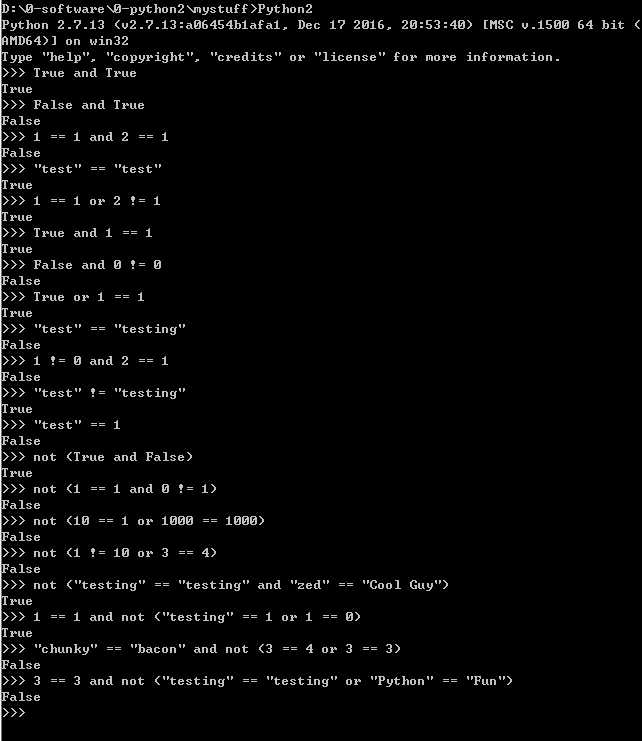笨办法学Python(二十八)
Posted
tags:
篇首语:本文由小常识网(cha138.com)小编为大家整理,主要介绍了笨办法学Python(二十八)相关的知识,希望对你有一定的参考价值。
习题 28: 布尔表达式练习
上一节你学到的逻辑组合的正式名称是“布尔逻辑表达式(boolean logic expression)”。在编程中,布尔逻辑可以说是无处不在。它们是计算机运算的基础和重要组成部分,掌握它们就跟学音乐掌握音阶一样重要。
在这节练习中,你将在 python 里使用到上节学到的逻辑表达式。先为下面的每一个逻辑问题写出你认为的答案,每一题的答案要么为 True 要么为 False。写完以后,你需要将python 运行起来,把这些逻辑语句输入进去,确认你写的答案是否正确。
- True and True
- False and True
- 1 == 1 and 2 == 1
- "test" == "test"
- 1 == 1 or 2 != 1
- True and 1 == 1
- False and 0 != 0
- True or 1 == 1
- "test" == "testing"
- 1 != 0 and 2 == 1
- "test" != "testing"
- "test" == 1
- not (True and False)
- not (1 == 1 and 0 != 1)
- not (10 == 1 or 1000 == 1000)
- not (1 != 10 or 3 == 4)
- not ("testing" == "testing" and "Zed" == "Cool Guy")
- 1 == 1 and not ("testing" == 1 or 1 == 0)
- "chunky" == "bacon" and not (3 == 4 or 3 == 3)
- 3 == 3 and not ("testing" == "testing" or "Python" == "Fun")
在本节结尾的地方我会给你一个理清复杂逻辑的技巧。
所有的布尔逻辑表达式都可以用下面的简单流程得到结果:
- 找到相等判断的部分 (== or !=),将其改写为其最终值 (True 或 False)。
- 找到括号里的 and/or,先算出它们的值。
- 找到每一个 not,算出他们反过来的值。
- 找到剩下的 and/or,解出它们的值。
- 等你都做完后,剩下的结果应该就是 True 或者 False 了。
下面我们以 #20 逻辑表达式演示一下:
3 != 4 and not ("testing" != "test" or "Python" == "Python")
接下来你将看到这个复杂表达式是如何逐级解为一个单独结果的:
- 解出每一个等值判断:
- 3 != 4 为 True: True and not ("testing" != "test" or "Python" == "Python")
- "testing" != "test" 为 True: True and not (True or "Python" == "Python")
- "Python" == "Python": True and not (True or True)
- 找到括号中的每一个 and/or :
- (True or True) 为 True: True and not (True)
- 找到每一个 not 并将其逆转:
- not (True) 为 False: True and False
- 找到剩下的 and/or,解出它们的值:
- True and False 为 False
这样我们就解出了它最终的值为 False.
Warning
复杂的逻辑表达式一开始看上去可能会让你觉得很难。而且你也许已经碰壁过了,不过别灰心,这些“逻辑体操”式的训练只是让你逐渐习惯起来,这样后面你可以轻易应对编程里边更酷的一些东西。只要你坚持下去,不放过自己做错的地方就行了。如果你暂时不太能理解也没关系,弄懂的时候总会到来的。
你应该看到的结果
以下内容是在你自己猜测结果以后,通过和 python 对话得到的结果:
$ python
Python 2.5.1 (r251:54863, Feb 6 2009, 19:02:12)
[GCC 4.0.1 (Apple Inc. build 5465)] on darwin
Type "help", "copyright", "credits" or "license" for more information.
>>> True and True
True
>>> 1 == 1 and 2 == 2
True

加分习题
- Python 里还有很多和 != 、 == 类似的操作符. 试着尽可能多地列出 Python 中的等价运算符。例如 < 或者 <= 就是。
- 写出每一个等价运算符的名称。例如 != 叫 “not equal(不等于)”。
- 在 python 中测试新的布尔操作。在敲回车前你需要喊出它的结果。不要思考,凭自己的第一感就可以了。把表达式和结果用笔写下来再敲回车,最后看自己做对多少,做错多少。
- 把习题 3 那张纸丢掉,以后你不再需要查询它了。
以上是关于笨办法学Python(二十八)的主要内容,如果未能解决你的问题,请参考以下文章